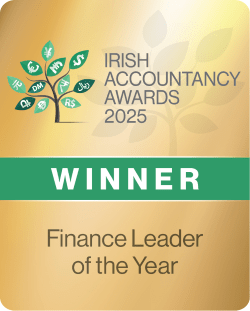Ireland’s technology sector is reaching new heights, with Dublin emerging as a major tech hub. Projected to grow by nearly 20% by 2029, reaching a market volume of €1.75 billion, there’s no better time to be a SaaS business in Ireland. The country’s strong technology ecosystem and supportive government policies make it a prime location for SaaS companies to thrive. But with growth comes responsibility, particularly when it comes to compliance.
Software as a service accounting is a specialized field that addresses the unique financial challenges of SaaS companies, like recurring revenue, subscription management, and complex metrics. In this guide, you’ll discover practical strategies for managing your SaaS company’s finances, staying compliant with Irish regulations, and building a strong foundation for growth.
We’ll look at everything from basic compliance requirements to advanced accounting techniques that can help your business thrive.

Why Ireland Is A SaaS Hotspot
The Irish technology ecosystem has created perfect conditions for SaaS growth, attracting both established players and innovative startups. This growth represents real opportunities for companies that understand how to manage their finances effectively.
Your SaaS company operates in a market that’s growing by 19.88% annually. This rapid growth brings both opportunities and challenges. While the potential for success is enormous, you need strong financial systems to capitalize on these opportunities.
What makes Ireland such a fertile ground for SaaS companies? Several factors contribute to this growth:
Firstly, Ireland’s strategic location provides access to European markets while maintaining close ties with the US tech sector. This positioning helps companies expand internationally while managing their revenue effectively through proper software as a service accounting practices.
Secondly, the government actively supports the tech sector through various initiatives. The recently announced €250 million Seed and Venture Capital Scheme demonstrates Ireland’s commitment to fostering tech innovation. This support extends beyond funding to include regulatory frameworks that understand the unique needs of SaaS businesses.
Finally, Ireland’s educated workforce provides the talent needed to build and scale successful SaaS companies. This human capital, combined with proper financial management, creates a foundation for sustainable growth.
Stay Ahead Of The Curve
As an Irish SaaS company, your compliance obligations are governed by the Companies Act 2014 and EU regulations. These requirements demand ongoing attention throughout the year, not just at filing time.
Key areas you need to manage include:
- Financial Statement Preparation: Your statements must follow FRS 102 standards and accurately reflect your subscription-based business model. This means properly recognizing revenue over service periods rather than at the point of sale.
- EU Audit Requirements: Companies exceeding certain thresholds must comply with EU audit regulations and IAASA (Irish Auditing & Accounting Supervisory Authority) guidelines.
- AGM Requirements: While many SaaS companies operate virtually, proper AGM documentation remains fundamental. Your accounting systems should help track and document these corporate governance requirements.
- Filing Deadlines: Missing CRO and Revenue deadlines can result in serious consequences. Proper software as a service accounting helps you stay ahead of these requirements.
Modern accounting solutions help by:
- Automating financial statement preparation according to Irish GAAP
- Maintaining detailed audit trails that meet EU standards
- Providing real-time compliance monitoring
- Generating comprehensive reports for Revenue and the CRO
The Power Of Automation
As specialists in small business accounting, we understand that choosing the right software is crucial for your SaaS company’s success.
Choosing the Right Tools
- Subscription Management: Look for tools that can handle various subscription models, upgrades, downgrades, and cancellations. Your software should make it easy to track and manage these changes while maintaining accurate financial records.
- Integration Capabilities: Your accounting software should work seamlessly with other business tools. This integration helps maintain accurate records and reduces manual data entry.
- Revenue Recognition: Understanding IFRS 15 is paramount for SaaS companies. This standard dictates how you recognize revenue from contracts with customers. Because SaaS typically involves providing a service over a period, you can’t recognize all the revenue upfront, even if you receive the payment that way.
- Identifying Performance Obligations: The first step is identifying the ‘performance obligations’ in your contract. This might be access to the software, ongoing support, or specific service level agreements (SLAs).
- Allocating the Transaction Price: You need to allocate the total transaction price to each performance obligation based on its relative standalone selling price.
- Recognizing Revenue Over Time: Revenue is recognized as each performance obligation is satisfied. This usually means recognizing it evenly over the subscription period.
Example: Imagine you sell a 12-month SaaS subscription for €12,000, including basic support. You recognize €1,000 of revenue each month. If the contract includes premium support with a standalone value of €2,400, you must allocate a portion of the €12,000 to the premium support and recognize that revenue as the support is delivered.
Failing to properly account for revenue under IFRS 15 can lead to inaccurate financial statements and potential compliance issues.
Popular Accounting Software Options in Ireland:
Several accounting software solutions are popular among Irish SaaS companies:
- Xero: Cloud-based accounting software known for its user-friendly interface and strong integration capabilities.
- QuickBooks Online: Another popular option, offering a range of features for small to medium-sized businesses, including subscription billing management.
- Sage Intacct: A more powerful solution designed for growing businesses with complex accounting needs, offering advanced features for revenue recognition and financial reporting.
- Surf Accounts: Another Irish-developed solution that caters specifically to Irish SMEs, with built-in features for Irish tax compliance and CRO filing
Disclaimer: This is not an exhaustive list, and the best software for your business will depend on your specific needs and requirements. We recommend conducting thorough research and comparing different options before making a decision. Consider factors such as pricing, features, integration capabilities, and user reviews.
Scaling For Success
Growth brings specific challenges for SaaS companies. Understanding and preparing for these challenges helps you build stronger financial systems.
Managing Scale
As your company grows, maintaining clear communication with Revenue becomes increasingly important for tax compliance. You need systems that can handle:
- Increased Transaction Volume: More customers mean more transactions to track and manage. Your software as a service accounting system must scale efficiently to handle this growth.
- International Expansion: Many Irish SaaS companies serve international markets. This brings currency conversion, tax implications, and compliance requirements that your systems must handle.
- Market Operations: As an Irish SaaS company, your primary market advantage is direct access to the EU Single Market. Your accounting system must handle EU VAT requirements, MOSS (Mini One Stop Shop) compliance, and intra-EU transactions.
- Compliance Across Markets: Managing compliance with Irish regulations while serving the EU market requires systems that understand both local and EU-wide requirements.
Resource Management
Proper resource allocation becomes crucial as you grow. This includes:
- Staff Development: Your team needs ongoing training to handle evolving financial requirements. Investment in training helps maintain compliance and efficiency.
- Technology Investment: Regular updates and upgrades to your accounting systems help maintain efficiency and compliance.

Government Support And Resources
Ireland provides significant support for tech companies. Understanding and accessing these resources can help fund your growth while maintaining proper financial management.
Available Programs
The Seed and Venture Capital Scheme represents just one of many support options. Check out our guide on ‘Every Business Grant And Support Available In Ireland’ for a comprehensive overview of available assistance.
These programs often require detailed financial records and reporting. Your software as a service accounting systems should help you meet these requirements easily.
Tax Benefits and Credits
Many companies miss out on available tax benefits. Our blog on ‘Are You Claiming All Your Tax Credits And Reliefs?’ provides valuable information about opportunities you might be missing.
Key Tax Benefits and Credits for Irish SaaS Companies:
- R&D Tax Credit: This is one of the most valuable tax credits available to innovative companies in Ireland. If your SaaS company is engaged in research and development activities, you may be eligible to claim a tax credit of 25% of qualifying R&D expenditure. Qualifying activities can include developing new software features, improving existing products, or conducting technical research.
- Knowledge Development Box (KDB): The KDB allows companies to apply a reduced corporation tax rate of 6.25% to profits derived from qualifying assets, such as software.
- Capital Allowances: You can claim capital allowances on investments in plant and machinery, including computer equipment and software.
- Employment and Investment Incentive (EII): EII provides tax relief to individual investors who invest in qualifying Irish companies. This can be a valuable source of funding for early-stage SaaS businesses.
Important Note: Tax laws and regulations are subject to change. It’s essential to consult with a qualified tax advisor to determine your eligibility for these benefits and ensure compliance with all applicable requirements.
Building Trust
Modern accounting systems handle sensitive data. Your responsibility includes protecting this information while maintaining transparency about your practices.
Data Protection Requirements
Your data protection obligations are overseen by the Data Protection Commission (DPC). Your accounting systems must:
- Comply with both GDPR and Irish Data Protection Act 2018 requirements
- Follow DPC guidelines for financial data processing
- Maintain records of processing activities (ROPAs) as required by Irish law
- Enable prompt response to data subject rights requests
- Implement appropriate security measures as per DPC recommendations
Technology Transparency
Clear communication about your technology use builds trust. This includes:
- Privacy policy updates
- Data handling disclosures
- Security measure documentation
- Compliance reporting
Beyond Compliance
The future brings new opportunities and challenges. Preparing for these changes helps maintain strong financial management.
Emerging Technologies
Watch for developments in:
- AI-powered accounting tools
- Blockchain applications
- Automated compliance systems
- Real-time reporting capabilities
Strategic Planning
Building for the future requires:
- Regular system reviews
- Staff training programs
- Technology updates
- Compliance monitoring
Strong financial management supports your SaaS company’s growth. By implementing proper software as a service accounting practices, you build a foundation for success while maintaining compliance with Irish regulations.
Ready to strengthen your financial systems? Contact us to learn how we can help your SaaS company build stronger accounting practices.
FAQs
What is SaaS accounting and why is it important for my Irish tech company?
SaaS accounting is a specialized approach to managing the finances of subscription-based businesses, helping you accurately track revenue, manage subscriptions, and stay compliant with Irish regulations.
How does IFRS 15 affect my SaaS revenue recognition?
IFRS 15 dictates how and when you recognize revenue, requiring you to allocate revenue over the subscription period rather than recognizing it all upfront.
What are the key compliance requirements for SaaS companies in Ireland?
Key requirements include adherence to the Companies Act 2014, EU regulations like IFRS 15, FRS 102 financial reporting standards, GDPR for data protection, and oversight from bodies like IAASA and the Central Bank of Ireland where applicable.
What should I look for in SaaS accounting software?
Look for features like automated revenue recognition, subscription management, integration capabilities, and robust reporting.
Can I claim R&D tax credits for my SaaS development activities?
Yes, if your company is engaged in qualifying research and development, you may be eligible for a 25% R&D tax credit on eligible expenditures.
How can I manage the challenges of scaling my SaaS accounting?
Implement scalable accounting systems, invest in staff training, and regularly review your processes to accommodate increased transaction volumes and complexity.
Are there government support programs available for Irish SaaS companies?
Yes, Ireland offers various programs, including the Seed and Venture Capital Scheme, Enterprise Ireland grants, and tax incentives like the Knowledge Development Box.
How does GDPR impact my SaaS accounting practices?
You must protect sensitive financial data, maintain proper access controls, document data handling procedures, and be transparent about your data practices.
What are the benefits of automating my SaaS accounting processes?
Automation reduces manual data entry, improves accuracy, ensures compliance, and frees up your team to focus on strategic initiatives.
How often should I review my SaaS accounting systems and processes?
You should conduct regular system reviews (at least annually) to ensure they meet your evolving needs and comply with changing regulations.











